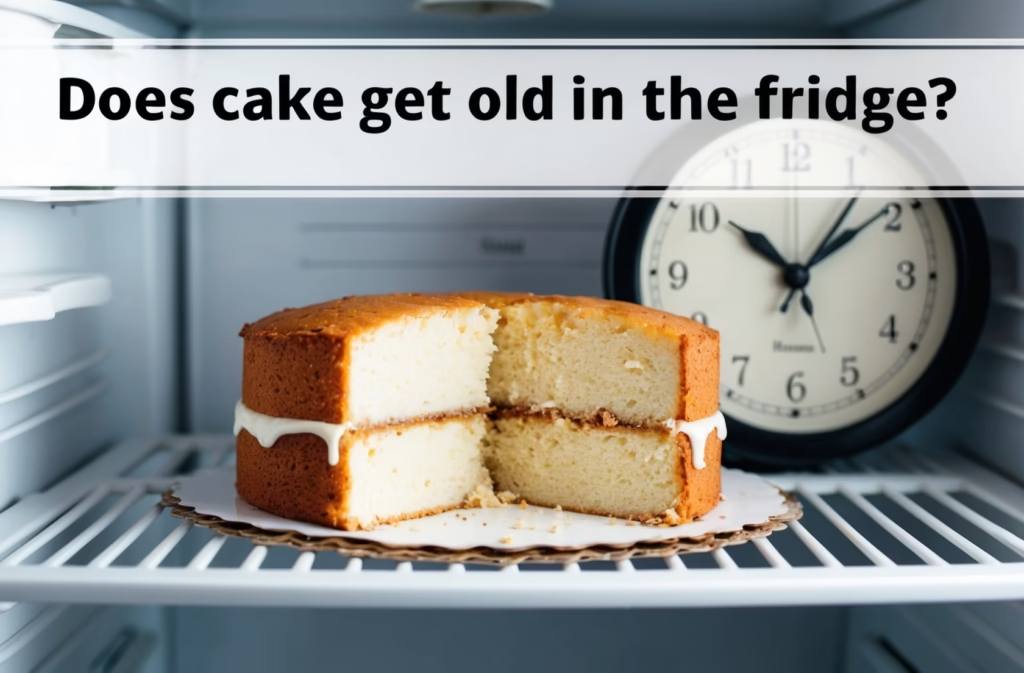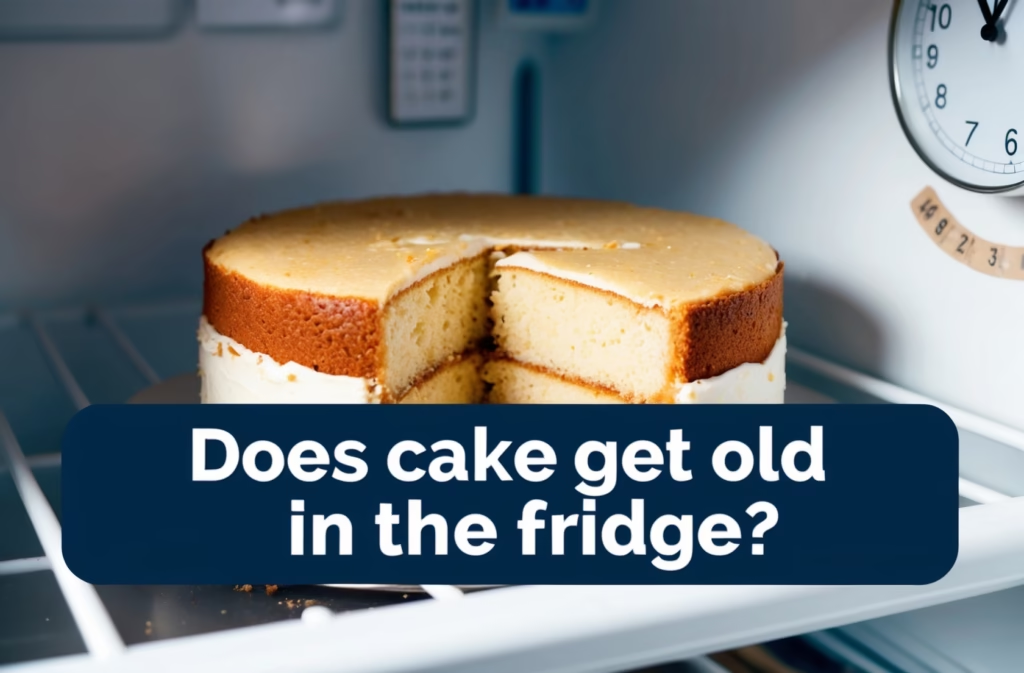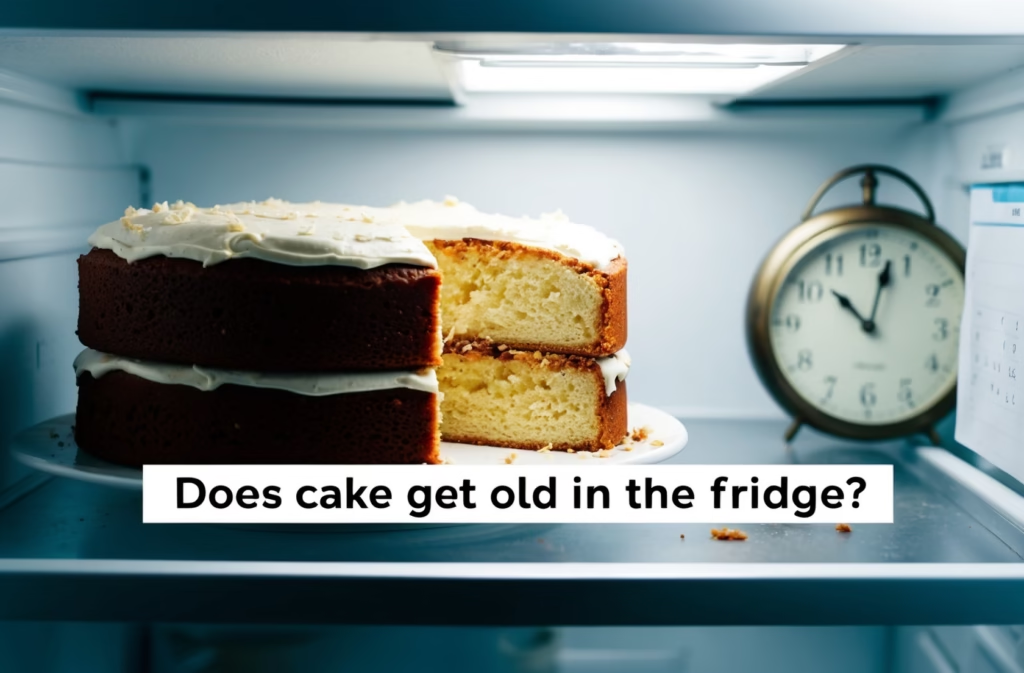Does Cake Get Old In The Fridge? How Long Does Cake Last In The Fridge? Find out if refrigerating cake is a good idea & how long it stays fresh. Can You Refrigerate Cake? Get expert tips & tricks for keeping your cake delicious!
Does Cake Get Old in the Fridge? A Baker’s Guide to Cake Storage
The question, Does cake get old in the fridge? is a common one among bakers and cake lovers alike. While refrigeration is often touted as a way to extend the shelf life of baked goods, it’s not a guaranteed solution for maintaining the optimal texture and flavor of all cakes. The answer is nuanced and depends heavily on the type of cake, its ingredients, and how it’s stored. This comprehensive guide will explore the intricacies of refrigerating cake, addressing questions such as How long does cake last in the fridge? and Can you refrigerate cake?
Understanding Cake and Refrigeration
Cakes, in their essence, are complex mixtures of flour, sugar, eggs, butter, and other ingredients. These ingredients react differently to cold temperatures. For instance, some cakes, especially those with high moisture content like a delicious mango coconut cake, might benefit from refrigeration to prevent spoilage. Others, particularly those with delicate icings or fillings, may suffer from a change in texture and flavor when chilled.
The primary reason we consider refrigerating cake is to slow down the growth of bacteria and mold. However, refrigeration can also lead to undesirable effects. The moisture in the cake can redistribute, leading to a drier, tougher crumb. Frosting, too, can become hardened or even separate, especially if it contains dairy products. The extreme temperature change can also impact the overall structure of the cake, altering its texture.
How Long Does Cake Last in the Fridge?
How long does cake last in the fridge? There’s no single answer. Generally, a well-made, unfrosted cake can last for 3-5 days in the refrigerator. However, frosted cakes, especially those with creamy fillings like the decadent Black Forest cake, may only last for 2-4 days due to the potential for faster spoilage of the frosting. Cakes with fillings that contain fresh fruits or custards, will have a shorter shelf life, possibly only 1-2 days, as these are more susceptible to bacterial growth.
Consider factors such as the type of frosting used. A simple buttercream might fare better than a cream cheese frosting in the fridge. Also, the quality of ingredients plays a role. Using fresh, high-quality ingredients from the start results in a cake that holds up better over time.
Can You Refrigerate Cake? A Type-by-Type Analysis
Can you refrigerate cake? The answer is: it depends. While refrigeration is often a good idea to prevent spoilage, it’s not always the best option for maintaining cake quality. Different types of cakes respond differently to cold temperatures.
Pound Cakes and Their Refrigerated Fate
Dense cakes like pound cakes are generally more resilient to the effects of refrigeration. Their rich, buttery texture can withstand the moisture changes better than lighter, airier cakes. However, even pound cakes will eventually become drier if left in the refrigerator for too long.
The Case of Moist Cakes and Refrigeration
Cakes known for their moisture, like a delightful moist rum cake, can become surprisingly dry when refrigerated. The cold temperatures can cause the moisture to evaporate more quickly, leading to a less desirable texture. For these cakes, storing them at room temperature in an airtight container is often a better approach for maintaining texture.
Cakes with Delicate Frostings
Cakes with delicate frostings, such as those made with whipped cream or certain types of ganache, are not ideal candidates for refrigeration. The cold temperatures can cause these frostings to become firm and less appealing. In such cases, consider storing the cake at room temperature in an airtight container and consuming it within a day or two.
Fruit Cakes and Refrigeration Considerations
Fruitcakes, due to their high concentration of fruit and often alcohol, can generally benefit from refrigeration, especially if they contain perishable fruits. However, their unique structure, while sturdy, will dry out in the fridge given enough time. They are often best stored at room temperature, or in a cool, dark place to maintain their moisture.
Alternatives to Refrigeration
If you’re concerned about the effects of refrigeration on your cake, there are alternative storage methods. Storing the cake in an airtight container at room temperature can prolong freshness, particularly for cakes without cream-based fillings or frostings. However, this approach needs to be used within the first day or two after baking, and you should be mindful of high temperatures and humidity which can spoil the cake.
To help extend the shelf life while retaining optimal quality, consider freezing your cake. Properly wrapped and stored in the freezer, many cakes can remain palatable for up to 2-3 months. This is especially effective for unfrosted cakes or those with simple frostings. Ensure to wrap the cake thoroughly to prevent freezer burn.
Identifying Spoiled Cake
Recognizing when your cake has spoiled is crucial for food safety. Look for signs of mold growth, which appears as fuzzy patches, often green or white. An unusual odor is another clear indicator. If your cake smells sour or off, discard it immediately. Similarly, any unusual texture changes, like excessive stickiness or unusual firmness, also signify potential spoilage.
Always practice safe food handling techniques. Wash your hands before handling cake and use clean utensils. If you have any doubts about the cake’s freshness, it’s always better to err on the side of caution and discard it.
Conclusion: Making the Right Choice for Your Cake
The question, Does cake get old in the fridge? highlights the complexity of cake storage. While refrigeration can help extend the shelf life and prevent spoilage, it doesn’t guarantee the preservation of texture and flavor. Consider the type of cake, its ingredients, and the type of frosting when deciding on the best storage method. Using proper storage techniques, including freezing, allows you to enjoy your delicious creations for a longer period.
For further insights into cake baking and storage, check out expert resources like the King Arthur Baking blog and Allrecipes for detailed guidance on storing various types of cakes.
Want to share your experiences with refrigerating different cakes? What are your favorite tips for keeping cakes fresh? Let us know in the comments below! Share your thoughts on how long does cake last in the fridge and what types of cake fare best in refrigeration!

Frequently Asked Questions: Cake Storage
- Does cake get old in the fridge?
- Yes, even in the fridge, cake will eventually get stale. While refrigeration slows down the staling process, it doesn’t stop it completely. The texture and flavor will change over time.
- How long does cake last in the fridge?
- Generally, a frosted cake will last 3-5 days in the refrigerator. Unfrosted cakes tend to dry out faster and may only last 2-3 days. Always check for mold or off odors before consuming.
- Can you refrigerate cake?
- Yes, you can refrigerate most cakes, especially those with creamy frostings that can melt at room temperature. However, some cakes, like those with delicate icings or fillings, may not benefit from refrigeration.
- Does refrigerating cake affect the taste?
- Refrigeration can slightly alter the taste and texture of cake. Some find that the flavors become less pronounced, and the texture might become slightly drier or firmer. The effects vary depending on the type of cake and frosting.
- How to tell if cake is bad after being refrigerated?
- Signs of bad cake include mold growth (visible fuzzy spots), an unpleasant smell, unusual texture changes (becoming slimy or excessively dry), or a noticeably off flavor.
- Does cake get stale faster in the fridge than at room temperature?
- No, cake generally gets stale slower in the refrigerator than at room temperature. However, it will still eventually become stale.
- Can I freeze cake? Is it better than refrigeration for long-term storage?
- Yes, freezing cake is a great option for longer-term storage (2-3 months). It’s generally better than refrigeration for preventing staling, but thawing may slightly alter the texture.
- How Long Does Cake Last In The Fridge if it’s unfrosted?
- Unfrosted cakes tend to dry out quicker. Expect them to last only 2-3 days in the refrigerator, potentially less depending on the ingredients and the environment.
- Does the type of frosting affect how long cake lasts in the fridge?
- Yes, buttercream frostings generally last longer in the fridge than lighter, cream-based frostings. The type of frosting can significantly impact the overall shelf life of the cake.
- My cake tastes off after being in the fridge, what should I do?
- If your cake tastes off, even slightly, discard it. Don’t risk food poisoning. Always prioritize food safety over consuming questionable food.

Does Cake Get Old in the Fridge? A Baker’s Guide to Cake Storage
One of the most frequently asked questions in baking circles revolves around cake storage. Does cake get old in the fridge? The short answer is, it depends. While refrigeration can extend the life of your cake, it can also negatively impact its texture and flavor. This comprehensive guide will delve into the intricacies of How Long Does Cake Last In The Fridge, addressing common concerns and offering tips for keeping your cakes fresh and delicious.
Can You Refrigerate Cake? The Great Refrigeration Debate
Yes, you absolutely can refrigerate cake, but the decision of whether or not to do so depends heavily on the type of cake and its ingredients. Cakes with fresh fruit fillings, creamy frostings, or custards are excellent candidates for refrigeration. These ingredients are highly perishable and refrigeration helps prevent spoilage and bacterial growth. A lemon curd cake, for instance, would benefit greatly from a stint in the fridge.
On the other hand, cakes with simple buttercreams or glazes, particularly those that are dense and less moist, might not need refrigeration. A pound cake, for example, often holds up well at room temperature for several days, wrapped tightly in plastic wrap.
However, even with less perishable cakes, refrigeration can impact texture. Some cakes can become dry or stale faster in the refrigerator due to the low humidity. The ideal approach is to evaluate your specific cake and your climate. In a humid environment, refrigeration may help prevent mold growth more effectively.
How Long Does Cake Last In The Fridge? A Timeline for Cake Preservation
The length of time a cake remains fresh in the refrigerator also hinges on its ingredients and storage techniques. Generally, cakes with perishable components, such as the previously mentioned Black Forest cake or mango coconut cake, should be consumed within 3-4 days of refrigeration. This timeframe minimizes the risk of bacterial contamination.
Cakes with less perishable components can sometimes last a bit longer. However, remember to always prioritize sensory checks: Does it smell off? Is the texture noticeably altered? If the answer to either of these is yes, it’s best to discard the cake, regardless of how long it has been in the refrigerator. For more in-depth information on food storage guidelines, you may consult the USDA Food Safety and Inspection Service. Learn more about food safety here.
Proper wrapping is crucial. Airtight containers or plastic wrap will significantly improve the cake’s longevity and prevent unwanted flavors from permeating.
Does Cake Get Old in the Fridge? Factors Affecting Cake Freshness
Several factors impact how quickly a cake deteriorates in the refrigerator. Firstly, the type of frosting plays a significant role. Cream cheese frosting, for example, will generally last a shorter period than a simple buttercream. Secondly, the ingredients used influence how well the cake maintains its texture and flavor. A cake made with high-quality ingredients, stored correctly, will generally last longer. The ambient temperature of your fridge is also crucial; a consistently cold temperature is essential for slowing bacterial growth. Finally, never store cake near strongly-scented items as this may transfer unwanted flavors.
Recipe: Moist Rum Cake (To Demonstrate Storage Techniques)
This recipe provides a delicious example of a cake that benefits from proper storage, be it room temperature or refrigeration. If you’re interested in another moist cake option, check out our Moist Rum Cake Recipe.
Ingredients:
- 1 ½ cups (190g) all-purpose flour
- 1 ½ teaspoons baking powder
- ¼ teaspoon baking soda
- ¼ teaspoon salt
- ½ cup (115g) unsalted butter, softened
- 1 ¾ cups (350g) granulated sugar
- 2 large eggs
- 1 teaspoon vanilla extract
- 1 cup (240ml) buttermilk
- ⅓ cup (80ml) dark rum
- Optional: Rum glaze (recipe below)
Instructions:
- Preheat oven to 350°F (175°C). Grease and flour a 9×13 inch baking pan.
- Whisk together flour, baking powder, baking soda, and salt.
- In a separate bowl, cream together butter and sugar until light and fluffy.
- Beat in eggs one at a time, then stir in vanilla.
- In a small bowl, combine buttermilk and rum.
- Gradually add the dry ingredients to the wet ingredients, alternating with the buttermilk mixture, beginning and ending with the dry ingredients. Mix until just combined.
- Pour batter into prepared pan and bake for 30-35 minutes, or until a wooden skewer inserted into the center comes out clean.
- Let cool completely before glazing (optional) and storing.
Optional Rum Glaze:
- 1 cup powdered sugar
- 2-4 tablespoons rum
- 1-2 tablespoons milk
Whisk together until smooth and desired consistency is reached. Pour over cooled cake.
Nutritional Information (Per Serving – 1/12 of Cake):
Note: This nutritional information is an estimate and may vary based on specific ingredients and brands used.
| Nutrient | Amount per Serving | % Daily Value (DV) |
|---|---|---|
| Calories | 350 | 17.5% |
| Total Fat | 18g | 22% |
| Saturated Fat | 10g | 50% |
| Trans Fat | 0g | 0% |
| Unsaturated Fat | 8g | – |
| Cholesterol | 60mg | 20% |
| Sodium | 150mg | 6% |
| Total Carbohydrate | 45g | 15% |
| Dietary Fiber | 1g | 4% |
| Sugars | 30g | – |
| Protein | 4g | 8% |
| Calcium | 50mg | 5% |
| Iron | 1mg | 6% |
| Vitamin A | 0% | 0% |
| Vitamin C | 0% | 0% |
Nutritional Summary:
This rum cake is relatively high in calories and fat, mainly due to the butter and sugar content. It’s a treat best enjoyed in moderation. However, it does provide a moderate amount of protein and some essential minerals like calcium and iron.
Storage Recommendations for Your Delicious Cake:
For optimal freshness, store your cake in an airtight container at room temperature for up to 3 days or in the refrigerator for 5-7 days. Always prioritize sensory checks before consumption.
For more detailed information on food storage, refer to this reliable resource: FoodSafety.gov This website offers comprehensive advice on safely storing a wide variety of foods, including baked goods.
Call to Action:
Try this moist rum cake recipe today and let us know what you think! Share your baking creations and tag us on social media using #MoistRumCake. Leave a comment below to share your experience, tips, or questions. Don’t forget to explore our other delicious cake recipes on our website! Happy Baking!

Does Cake Get Old in the Fridge? A Guide to Cake Storage
The question of whether cake gets old in the fridge is a common one, and the answer is nuanced. It depends heavily on the type of cake and its ingredients. For instance, a rich, dense cake like a pound cake will generally hold up better in the refrigerator than a lighter, more delicate cake. However, even the sturdiest cakes will eventually suffer from the effects of refrigeration.
One primary concern is moisture. While refrigeration slows down spoilage, it can also alter the texture of your cake. Some cakes, especially those with a high moisture content like a mango coconut cake, may become soggy or overly soft after several days in the fridge. The frosting can also be affected, potentially becoming hard or separating. This is why it’s crucial to consider the individual characteristics of your cake.
Another factor is the type of frosting used. Cream cheese frostings, for example, tend to become firmer in the refrigerator, potentially affecting the overall taste and texture. Conversely, buttercream frostings can sometimes become too soft. Cakes with fillings, such as a Black Forest cake, require even more careful consideration as the filling might absorb moisture or change consistency.
To maximize the shelf life of your cake, consider storing it in an airtight container. This helps to prevent it from drying out or absorbing odors from other foods. While refrigeration is generally recommended for cakes that contain perishable ingredients such as cream or custard, it’s not always necessary. Cakes without perishable ingredients, such as a lemon curd cake, can sometimes last longer at room temperature in an airtight container, although it will still eventually begin to stale.
For cakes with alcohol-based ingredients, like a moist rum cake, refrigeration can help to retain flavor and prevent the alcohol from evaporating too quickly. However, be aware that the alcohol may also affect the texture over time.
Ultimately, the best approach is to taste-test your cake regularly. If it still tastes and feels fresh, it’s likely still safe to eat. Pay attention to any changes in texture, smell, or taste, and err on the side of caution if anything seems off.